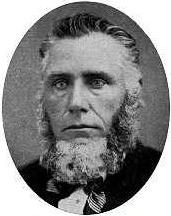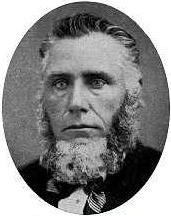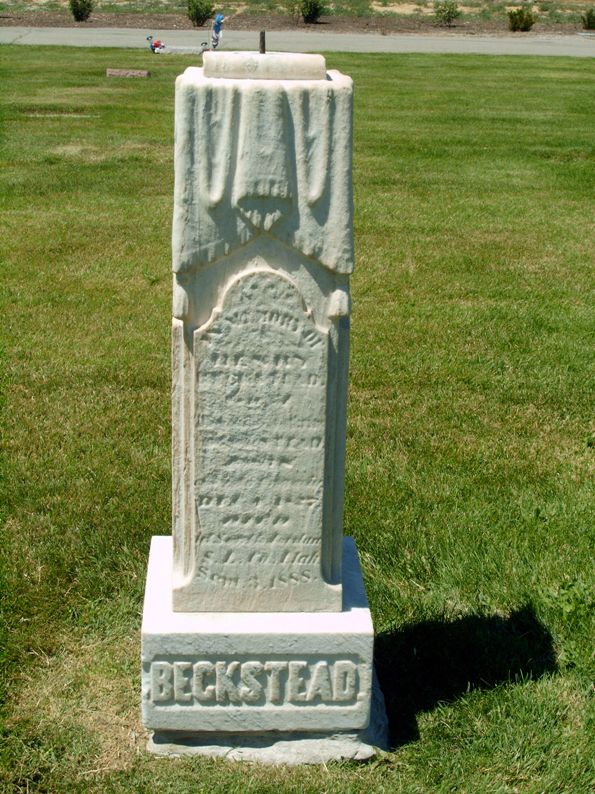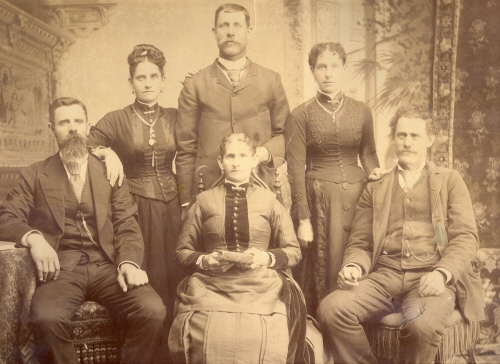Married Lucene Bird Bybee, 6 Jun 1848, North Pigeon, Iowa; 5 children.
Married Emily Grace Williams, 6 Mar 1857, Salt Lake City, Salt Lake, Utah; 7 children.
Married Emma Marsden, 3 Mar 1862, Salt Lake City, Salt Lake, Utah; 5 children.
Married Elizabeth Wood, Apr 1862, Salt Lake City, Salt Lake, Utah; 3 children.
Married Mary Hannah Williams, 6 Oct 1875; 2 children.
History - Henry Beckstead, son of Alexander Beckstead and Catherine Lince, was born 4 Dec 1827 (at Matilda), Williamsburg, Ontario, Canada. He was the 3rd of 15 children in this family. His early life was spent helping his father and mother with duties about the home and farm, and he received a fine training from his parents.
The Gospel message was taken to the home of his parents, and grand-parents, in Canada, and accepted by them. In the following year, 1838, the families, being among the very first ones to leave that area, left Canada to join the Saints. They traveled with ox teams and finally arrived at DeWitt, Missouri, the last September 1838 — only to find the mobs molesting the Saints day and night. It was impossible for them to settle in a home, and they continued living in their wagons, until they finally escaped the mobs, and journeyed in the Winter Quarters area for the rest of the winter. In the spring of 1839, they again moved with the Saints to the area of Nauvoo, Illinois where they again underwent the persecution of the mobs. The family again found it necessary to move, when the Saints were forced to flee with their lives, and few possessions from Nauvoo, and they located temporarily in the area of Council Bluffs, Iowa.
Henry married (1) Lucene Bird Bybee, 6 June 1848, at North Pigeon, Iowa, and to them were born five children. Following their marriage they started for the Salt Lake Valley in a covered wagon drawn by four oxen, as members of the Redden Allred Company. Lucene drove the ox team, because her husband, Henry, was assigned to be one of the hunters to provide wild game and fresh meat for the members of the wagon train. They arrived in Utah in 1849.
While crossing the plains en route to the Rocky Mountains, a vast herd of stampeding buffalo caused the oxen on the Beckstead wagon to bolt and run away, throwing Lucene out of the wagon into the prairie and inflicting a deep long flesh wound in her cheek, which upon healing left a long prominent scar, as evidence of the hazards encountered by the Mormon pioneers during their migration to Utah.
Henry Beckstead was a Nauvoo veteran and a Utah pioneer of 1849, who dug ditches, built forts, defended the place and safety of his neighbors and always gave of his time and talent for the building up of any community in which he lived. Henry was one of those sturdy souls the memory of whom posterity delights to keep alive.
Henry first settled in Uintah Valley (Utah) in 1850, along with others who were attempting to locate and build a home. He laid out plans, dug ditches, put in head gates and took out the first water for irrigation purposes from the Weber River. Some of the other families settling there were John M. Bybee, Joseph Hardy, Joseph Kinsbury, Daniel Smith, John L. Smith and John W. Winward. About this time they built a fort that was 500 feet north and south and 1320 feet east and west. Many were attracted to this fertile valley, and soon it became over populated, and with too little land and water, the people gradually drifted away to other neighboring communities.
In 1854 Henry Beckstead moved to Ogden, where he became Sheriff of Weber County. In 1856 he helped the belated handcart companies into the Territory, after they had become stranded on their way, and most were nearly starved.
History records the movement of Federal Troops, known as Johnson's Army, into the Utah Territory in 1857, and the 'move South' of the families of the Saints. Henry moved his family south to Provo, where he left them, and returned to Salt Lake City. He was a member of the militia, and went with Lot Smith and a chosen group of men entrusted with the task of delaying, or destroying the army's supply trains. Henry and the cavalrymen captured and burned 51 wagons in three separate trains along the Green River without firing a shot. Because of this the Army was seriously crippled and forced to go into camp for the winter thus allowing time for negotiations and correction of the misunderstandings that had prompted the invasion of the Territory. Five years later this same Lot Smith headed a cavalry troop of the U.S. Army in the Civil War.
In 1861 Henry moved his family to South Jordan, Utah. Here again he was a 'Minute Man,' and served as a Captain of the cavalry in the Black Hawk Indian War in souther Utah.
Henry always took an active part in ecclesiastical duties, and was a counselor to Bishop William A. Bills for 20 years in the South Jordan Ward. As a progressive agriculturist he brought into the Territory one of the first modern threshing machines, and had an active part in the development, through helping to establish irrigation companies and otherwise, of the West side of Salt Lake Valley.
Henry married (2) Emily Grace Williams; (3) Emma Marsden; (4) Elizabeth Wood; and (5) Mary Hannah Williams.
He lived a rich life with many experiences of early Church history. One of the most revered memories was in living near Nauvoo, seeing the Prophet Joseph Smith, and hearing him speak, and his sad recollection of seeing the bodies of the Prophet and his brother Hyrum Smith being returned to their home, after their martyrdom in Carthage jail.
Henry was loved and respected by his many friends. His name will always stand out as one of the true pioneers of the West. He passed away 3 September 1888, and is buried in South Jordan Cemetery.
Copied from: "Descendants of John Beckstead" complied by Lee Allen Beckstead and published by "The Beckstead Family Organization" 1963
Married Lucene Bird Bybee, 6 Jun 1848, North Pigeon, Iowa; 5 children.
Married Emily Grace Williams, 6 Mar 1857, Salt Lake City, Salt Lake, Utah; 7 children.
Married Emma Marsden, 3 Mar 1862, Salt Lake City, Salt Lake, Utah; 5 children.
Married Elizabeth Wood, Apr 1862, Salt Lake City, Salt Lake, Utah; 3 children.
Married Mary Hannah Williams, 6 Oct 1875; 2 children.
History - Henry Beckstead, son of Alexander Beckstead and Catherine Lince, was born 4 Dec 1827 (at Matilda), Williamsburg, Ontario, Canada. He was the 3rd of 15 children in this family. His early life was spent helping his father and mother with duties about the home and farm, and he received a fine training from his parents.
The Gospel message was taken to the home of his parents, and grand-parents, in Canada, and accepted by them. In the following year, 1838, the families, being among the very first ones to leave that area, left Canada to join the Saints. They traveled with ox teams and finally arrived at DeWitt, Missouri, the last September 1838 — only to find the mobs molesting the Saints day and night. It was impossible for them to settle in a home, and they continued living in their wagons, until they finally escaped the mobs, and journeyed in the Winter Quarters area for the rest of the winter. In the spring of 1839, they again moved with the Saints to the area of Nauvoo, Illinois where they again underwent the persecution of the mobs. The family again found it necessary to move, when the Saints were forced to flee with their lives, and few possessions from Nauvoo, and they located temporarily in the area of Council Bluffs, Iowa.
Henry married (1) Lucene Bird Bybee, 6 June 1848, at North Pigeon, Iowa, and to them were born five children. Following their marriage they started for the Salt Lake Valley in a covered wagon drawn by four oxen, as members of the Redden Allred Company. Lucene drove the ox team, because her husband, Henry, was assigned to be one of the hunters to provide wild game and fresh meat for the members of the wagon train. They arrived in Utah in 1849.
While crossing the plains en route to the Rocky Mountains, a vast herd of stampeding buffalo caused the oxen on the Beckstead wagon to bolt and run away, throwing Lucene out of the wagon into the prairie and inflicting a deep long flesh wound in her cheek, which upon healing left a long prominent scar, as evidence of the hazards encountered by the Mormon pioneers during their migration to Utah.
Henry Beckstead was a Nauvoo veteran and a Utah pioneer of 1849, who dug ditches, built forts, defended the place and safety of his neighbors and always gave of his time and talent for the building up of any community in which he lived. Henry was one of those sturdy souls the memory of whom posterity delights to keep alive.
Henry first settled in Uintah Valley (Utah) in 1850, along with others who were attempting to locate and build a home. He laid out plans, dug ditches, put in head gates and took out the first water for irrigation purposes from the Weber River. Some of the other families settling there were John M. Bybee, Joseph Hardy, Joseph Kinsbury, Daniel Smith, John L. Smith and John W. Winward. About this time they built a fort that was 500 feet north and south and 1320 feet east and west. Many were attracted to this fertile valley, and soon it became over populated, and with too little land and water, the people gradually drifted away to other neighboring communities.
In 1854 Henry Beckstead moved to Ogden, where he became Sheriff of Weber County. In 1856 he helped the belated handcart companies into the Territory, after they had become stranded on their way, and most were nearly starved.
History records the movement of Federal Troops, known as Johnson's Army, into the Utah Territory in 1857, and the 'move South' of the families of the Saints. Henry moved his family south to Provo, where he left them, and returned to Salt Lake City. He was a member of the militia, and went with Lot Smith and a chosen group of men entrusted with the task of delaying, or destroying the army's supply trains. Henry and the cavalrymen captured and burned 51 wagons in three separate trains along the Green River without firing a shot. Because of this the Army was seriously crippled and forced to go into camp for the winter thus allowing time for negotiations and correction of the misunderstandings that had prompted the invasion of the Territory. Five years later this same Lot Smith headed a cavalry troop of the U.S. Army in the Civil War.
In 1861 Henry moved his family to South Jordan, Utah. Here again he was a 'Minute Man,' and served as a Captain of the cavalry in the Black Hawk Indian War in souther Utah.
Henry always took an active part in ecclesiastical duties, and was a counselor to Bishop William A. Bills for 20 years in the South Jordan Ward. As a progressive agriculturist he brought into the Territory one of the first modern threshing machines, and had an active part in the development, through helping to establish irrigation companies and otherwise, of the West side of Salt Lake Valley.
Henry married (2) Emily Grace Williams; (3) Emma Marsden; (4) Elizabeth Wood; and (5) Mary Hannah Williams.
He lived a rich life with many experiences of early Church history. One of the most revered memories was in living near Nauvoo, seeing the Prophet Joseph Smith, and hearing him speak, and his sad recollection of seeing the bodies of the Prophet and his brother Hyrum Smith being returned to their home, after their martyrdom in Carthage jail.
Henry was loved and respected by his many friends. His name will always stand out as one of the true pioneers of the West. He passed away 3 September 1888, and is buried in South Jordan Cemetery.
Copied from: "Descendants of John Beckstead" complied by Lee Allen Beckstead and published by "The Beckstead Family Organization" 1963
Bio by: SMS
Family Members
-
![]()
Margaret Mariah Beckstead Egbert
1823–1901
-
![]()
Pvt Gordon Silas Beckstead
1825–1891
-
![]()
Harriet Vernisha Beckstead Hunsaker
1831–1905
-
![]()
Thomas Wesley Beckstead
1833–1893
-
Lucy Ann Beckstead
1835–1848
-
![]()
Emeline Beckstead Bills
1837–1917
-
![]()
Sarah Elizabeth Beckstead Winward
1838–1890
-
![]()
Samuel Alexander Beckstead Sr
1840–1861
-
Amanda Jane Beckstead
1843–1844
-
![]()
George Washington Beckstead
1845–1912
-
![]()
John Alma Beckstead Sr
1848–1927
-
![]()
Joseph Alonzo Beckstead
1850–1923
-
![]()
Hyrum Beckstead
1855–1937
-
![]()
Moses William Beckstead Sr
1857–1916
-
![]()
Eliza Ariminta Beckstead Lee
1857–1923
-
![]()
Aaron Beckstead
1858–1924
-
![]()
Catherine Lince Beckstead Foisy
1859–1926
-
![]()
Fanny Kesiah Beckstead Williams
1859–1936
-
![]()
Robert Beckstead
1861–1921
-
![]()
Clarisa Ann Beckstead
1861–1861
-
![]()
Margaret Albine Beckstead Hibbard
1862–1944
-
Viola Janette Beckstead
1862–1863
-
![]()
Martha Ann Beckstead Aylett
1864–1930
-
![]()
Heber Alexander Beckstead
1865–1925
-
![]()
Francis Albert Beckstead
1866–1952
-
![]()
Ira "Irrie" Beckstead
1867–1938
-
![]()
Ermine Araminta Beckstead
1867–1867
-
![]()
Susan Vilinda Beckstead
1868–1869
-
![]()
Alexander Beckstead
1870–1942
-
![]()
Henry Byram Beckstead
1850–1930
-
![]()
William Alexander Beckstead
1852–1916
-
![]()
Gordon Silas Beckstead
1854–1930
-
![]()
Betsy Lucene Beckstead Thompson
1856–1933
-
![]()
Delilah Jane Beckstead Sellers
1858–1890
-
![]()
Emily Bathsheba Beckstead Bills
1859–1937
-
![]()
Samuel Henry Beckstead
1860–1941
-
![]()
Catherine Beckstead Holt
1862–1957
-
![]()
Joseph M. Beckstead
1864–1865
-
![]()
James W. Beckstead
1864–1891
-
![]()
John Carlos Beckstead
1866–1867
-
![]()
George Nelson Beckstead
1866–1939
-
![]()
Mary Ann Beckstead Beckstead
1866–1951
-
Charles B. Beckstead
1868–1868
-
Alonzo Beckstead
1868–1868
-
![]()
Isaac Newton Beckstead
1868–1944
-
John Walter Beckstead
1870–1870
-
William Arthur Beckstead
1870–1870
-
![]()
Sarah Elizabeth Beckstead Shields
1870–1899
-
![]()
Jesse Nimrod Beckstead
1870–1959
Advertisement
Explore more
Sponsored by Ancestry
Advertisement






















































